Related Research Articles

Council Bluffs is a city in and the county seat of Pottawattamie County, Iowa, United States. The population was 62,799 at the 2020 census, making it the state's tenth most populous city, and the most populous city in Southwest Iowa. The Omaha metropolitan region of which Council Bluffs is a part, is the 58th largest in the United States, with an estimated population of 983,969 (2023). It is located on the east bank of the Missouri River, across from Omaha, Nebraska. Until about 1853 Council Bluffs was known as Kanesville. Kanesville was the historic starting point of the Mormon Trail. Kanesville is also the northernmost anchor town of the other emigrant trails because there was a steam-powered boat which ferried the settlers' wagons and cattle across the Missouri River. In 1869, the first transcontinental railroad to California was connected to the existing U.S. rail network at Council Bluffs.

Grant DeVolson Wood was an American artist and representative of Regionalism, best known for his paintings depicting the rural American Midwest. He is particularly well known for American Gothic (1930), which has become an iconic example of early 20th-century American art.
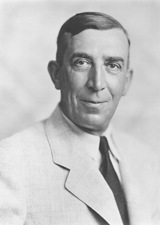
George Allison Wilson was an American politician and lawyer. He was a United States Senator and 28th Governor of Iowa.

Hubert M. Houser was the Iowa State Senator from the 49th District. He served in the Iowa Senate from 2002, when he filled a vacancy left by Derryl McLaren's resignation, until 2013.

Joseph Lyman was a Civil War soldier, lawyer, and judge. In the 1880s, he was a two-term Republican U.S. Representative from Iowa's 9th congressional district in southwestern Iowa.
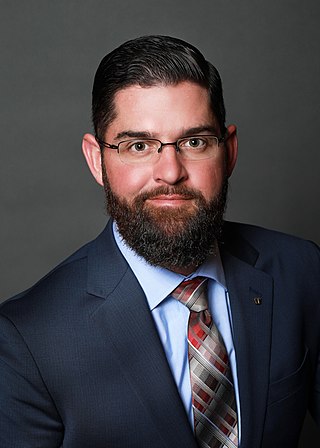
Matt W. Windschitl is an American politician and businessman serving as a member of the Iowa House of Representatives from the 15th District and Majority Leader of the House

Cassius Clay Dowell was a Republican U.S. Representative from Iowa. He served from 1915 to 1935, and again from 1937 until his death in 1940, with the interregnum caused by an unsuccessful campaign for reelection in 1934.
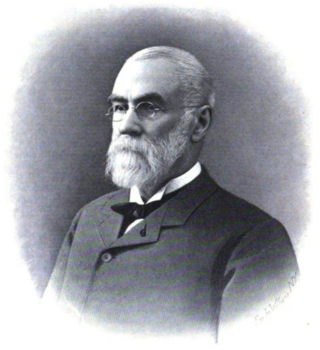
Joseph Rea Reed was an Iowa Supreme Court justice, one-term Republican U.S. Representative from Iowa's 9th congressional district in southwestern Iowa, and chief justice of a specialized federal court.

Thomas Bowman was a local official, newspaper publisher, and one-term Democratic U.S. Representative from Iowa's 9th congressional district. Benefiting from an electoral backlash in 1890 against Republicans for their support of the McKinley Tariff, Bowman's election was a rare nineteenth century Democratic win in traditionally Republican southwestern Iowa.
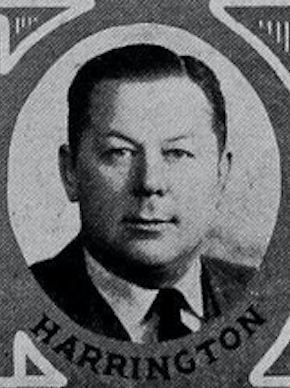
Vincent Francis Harrington was a Democratic U.S. Representative from Iowa. Harrington was commissioned in the United States Army Air Forces after the Pearl Harbor attack, resigned from Congress when President Franklin D. Roosevelt disallowed members of Congress from serving in the military at the same time, and died of natural causes while on active duty in England. A Liberty Ship was named in his honor.
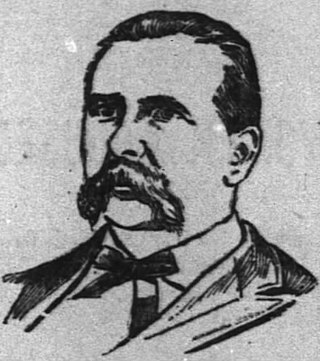
Walter Halben Butler was a lawyer, teacher, newspaper publisher, and one-term Democratic U.S. Representative from Iowa's 4th congressional district, then located in northeastern Iowa.

Walter Inglewood Smith was a United States representative from Iowa and a United States circuit judge of the United States Court of Appeals for the Eighth Circuit and the United States Circuit Courts for the Eighth Circuit.

William Fletcher Sapp was a United States Attorney and later a Republican U.S. Representative from Iowa's 8th congressional district. He was a nephew of William R. Sapp, who represented a U.S. House district in Ohio between 1853 and 1857.

Charles Edward Swanson served two terms as a Republican U.S. Representative from Iowa's 9th congressional district. His congressional career ended in the landslide that accompanied the election of Franklin D. Roosevelt to his first term as president.
Moses Franklin Shinn was a pioneer Methodist Episcopal Church minister in Omaha, Nebraska. Aside from founding Omaha's first cemetery, called Prospect Hill, he was also renowned for renouncing his Methodist affiliation in Keokuk, Iowa in order to remain a member of the Freemasons. The incident was probably the only of its kind ever to occur in the history of the Masons. Late in his life, Shinn was reportedly "one of the wealthiest citizens of Omaha".
Milo Oscar Smith was an American football player and coach.

Robert Vernon Denney was an American politician and judge who served in the United States House of Representatives for Nebraska's 1st congressional district and federal judge of the United States District Court for the District of Nebraska. He was a member of the Republican Party.
Randolph Henry Weber was a United States district judge of the United States District Court for the Eastern District of Missouri.

J. Brent Siegrist is an American politician from the state of Iowa. A member of the Republican Party, he served in the Iowa House of Representatives for twenty years, non-consecutively, ten of which he filled the role of Speaker.

Jon Jacobsen is an American politician who served as a member of the Iowa House of Representatives from the 22nd district. He was elected in a July 12, 2017 special election. Jacobsen is an attorney and a trust officer in a bank.
References
- ↑ "Representative Dennis E. Butler". Iowa General Assembly. Retrieved 28 March 2022.